Peter MALONE
OCTOBER 29th, NATIONAL DAY OF SOLIDARITY FOR KIDS IN DETENTION
OCTOBER 29th, NATIONAL DAY OF SOLIDARITY FOR KIDS IN DETENTION
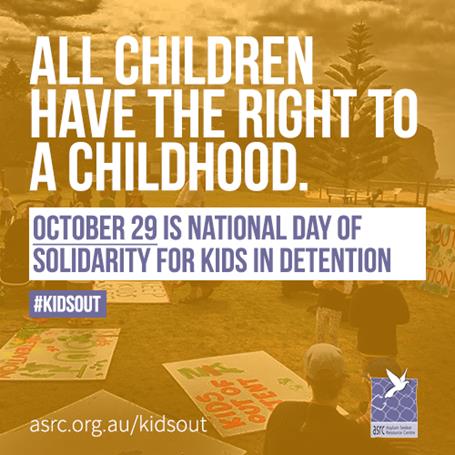
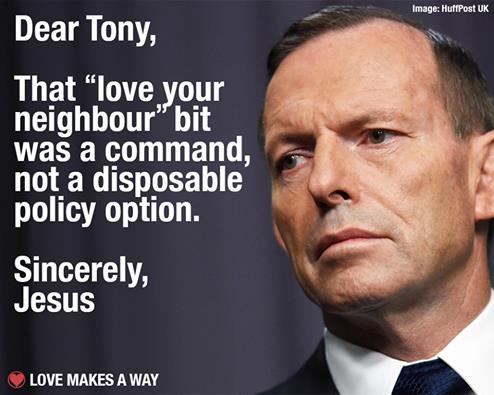

POPE FRANCIS' CONCLUDING SPEECH AT SYNOD
Pope Francis’ Concluding Synod Speech Stresses Mercy Above Law
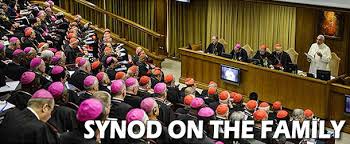
Below is the next installment of Bondings 2.0’s reports from the Synod on Marriage and Family in Rome. New Ways Ministry’s Executive Director Francis DeBernardo..
It has been said, and I think it’s accurate, that the only times that Pope Francis uses harsh, pointed language is when he is addressing bishops. Throughout his pontificate, he has been fearless in correcting them for not using their offices fully for the good of the people of the Church. His latest speech was no exception. At one point, he provided a list of descriptions of what he thought the synod was about. Here are a few gems from that list:
“It was about bearing witness to everyone that, for the Church, the Gospel continues to be a vital source of eternal newness, against all those who would ‘indoctrinate’ it in dead stones to be hurled at others.
“It was also about laying closed hearts, which bare the closed hearts which frequently hide even behind the Church’s teachings or good intentions, in order to sit in the chair of Moses and judge, sometimes with superiority and superficiality, difficult cases and wounded families. . . .
“It was about trying to open up broader horizons, rising above conspiracy theories and blinkered viewpoints, so as to defend and spread the freedom of the children of God, and to transmit the beauty of Christian Newness, at times encrusted in a language which is archaic or simply incomprehensible.
“In the course of this Synod, the different opinions which were freely expressed – and at times, unfortunately, not in entirely well-meaning ways – certainly led to a rich and lively dialogue; they offered a vivid image of a Church which does not simply ‘rubberstamp,’ but draws from the sources of her faith living waters to refresh parched hearts.“
And, in the opposite style, his most generous language is often that when he is welcoming people to the Church and into the love of God:
“The Synod experience also made us better realize that the true defenders of doctrine are not those who uphold its letter, but its spirit; not ideas but people; not formulae but the gratuitousness of God’s love and forgiveness. This is in no way to detract from the importance of formulae, laws and divine commandments, but rather to exalt the greatness of the true God, who does not treat us according to our merits or even according to our works but solely according to the boundless generosity of his Mercy (cf. Rom 3:21-30; Ps 129; Lk 11:37-54). It does have to do with overcoming the recurring temptations of the elder brother (cf. Lk 15:25-32) and the jealous labourers (cf. Mt 20:1-16). Indeed, it means upholding all the more the laws and commandments which were made for man and not vice versa (cf. Mk 2:27). . . .
“The Church’s first duty is not to hand down condemnations or anathemas, but to proclaim God’s mercy, to call to conversion, and to lead all men and women to salvation in the Lord (cf. Jn 12:44-50).”
And Pope Francis pointed the way forward with his message of mercy for all:
“In effect, for the Church to conclude the Synod means to return to our true “journeying together” in bringing to every part of the world, to every diocese, to every community and every situation, the light of the Gospel, the embrace of the Church and the support of God’s mercy!”
The speech also included some of the more troublesome parts of Pope Francis’ rhetoric, in which he defends more traditional conceptions of family, too. He said the Church should be “defending the family from all ideological and individualistic assaults. He defined marriage as “between a man and a woman, based on unity and indissolubility, and valuing it as the fundamental basis of society and human life.” He warned against the danger of “relativism.”
Yet these references seem less powerful than his more eloquent calls to challenging archaic concepts and attitudes illustrated by the quotations above.
–Francis DeBernardo, New Ways Ministry
VIGIL FOR THOSE SEEKING ASYLUM IN OUR LAND
Vigil for those seeking asylum in our land
AS LONG AS YOU DID IT TO ONE OF THESE, THE LEAST OF MY BROTHERS AND SISTERS, YOU DID IT TO ME.

Australia’s religious leaders are meeting in Canberra on Thursday, 15th October to express their concern about the plight of asylum seekers throughout the world, and their ongoing concern for those detained in off-shore detention centres.
A vigil will be held at Mary MacKillop Chapel at 6.00 pm on 12th October to pray that the minds and hearts of politicians and of all Australians will be touched by the plight of some of the world’s most vulnerable people. We invite you to join us in prayer for those seeking asylum and for those who are speaking out and acting for justice. We pray particularly with religious leaders who will be meeting with the political leaders on the 15th October.
As we keep vigil, we grieve and pray for those who are suffering.
People of good will from across the world are invited to join us in prayer on this day. If you wish, you could post a prayer on line (http://www.marymackillop.org.au).
DETAILS
DATE: Monday, 12th October
VENUE: Mary MacKillop Chapel, 13 Mount St, North Sydney
TIME: 6.00 pm (with soup and rolls to follow)
RSVP: (for catering purposes) This email address is being protected from spambots. You need JavaScript enabled to view it. or This email address is being protected from spambots. You need JavaScript enabled to view it. Thursday, 8th October
GAYBE BABY
GAYBY BABY
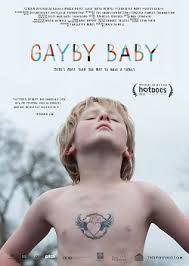
This current release is topical. A review: Australian Catholic Bishops' Conference website.
Australia, 2015, 83 minutes, Colour. Directed by Maya Newell.
As the title indicates, the focus of the film is on children of same-sex coupled families. The opening credits display many photos of traditional nuclear families, then move to the same-sex parents and their families with underlying quotations critical of same-sex families as well as supportive.
One of the important sayings for understanding others is that we should walk in their shoes for some time. Probably, a great number of potential audiences for this film would be quite unwilling to walk in the shoes of the same-sex parents, feeling uncomfortable, disapproving – or both. But, the aim of the film is to tell stories, invite audiences to identify with the characters and their situations, experience something of the reality of the partnerships as well is the parenting, the normal problems and day-by-day situations and challenges and, especially, the way that the children handle the situation, their understanding, the way they communicate this.
The documentary focuses on four families, three with same-sex mothers, one with same-sex fathers. While the parents are a strong presence, the film says its importance is focusing on the children, their voices, their experiences, the type of family living that they have, the influence of the same-sex parents, the absence of an opposite sex parent.
The film interweaves the four stories.
At the time of the filming, Gus was 11, with two mothers, and younger sister, Rory. Gus is a rather rowdy boy, with a great passion for wrestling, often wrestling in the house with his younger sister, who sometimes encouraged him, but got the worse of the bouts which led to tears. This is of concern to the main parenting mother, who has some confrontations with her son, who can be particularly wilful, storming off in the middle of a conversation, his mother trying to get him to participate in music classes as well as in debating. Many of the ordinary problems in any household and family come to the surface. While reluctant earlier, the mother takes Gus to the world wrestling exhibition.
Matt is 12 and has an older brother. There are two mothers in the house, one previously married, now divorced, with her sons and her new partner who is supportive and tends to stay more in the background, leaving the parenting to the birth mother. The mother is quite religious, explaining that she was brought up with bible stories, wanting her son to go to church on Sunday (when he wants to play Australian rules), the boy upset that the priest has condemned his mothers as sinful. He is very bright boy, a strong presence. The family was invited to have a meal with Julia Gillard, her opposition to same-sex marriage being clearly stated. They watch the program on television – and there is a scene where Matt faces the media, saying what he felt and explaining his words to the Prime Minister, a plea for partnerships where people love each other. Ultimately, his mothers do go to the football to support him, Matt not particularly wanting to go to church but explaining that his mother has not lost her faith.
Graham has two fathers. They have fostered him and now have adopted him, one of them taking the role of the father and the other being supportive. Graham is also 12. They move to Fiji, settling in, with scenes of Graham going to school, in class, the local children, the teacher, and his having to write an essay about himself to be read to the class. There are scenes at home with his writing his essay with the help of his father. The issue comes up about whether to let people know about the same-sex family, the father indicating that there is a time and place for revealing things and for not revealing things, Graham speculating on good lies which have a good outcome.
The girl in the film is called Ebony-Rose, from the outer western suburbs of Sydney, again with two mothers. They make a visual impact, with many facial rings and piercings and elaborate tattoos. Ebony wants to be a singer, is interested in going to a high school of the arts in Newtown in inner Sydney, prepares a song, goes for an audition, but does not get in, later, rather ruefully, saying that she had given up her ambitions to be a singer. Ebony gets a new uniform and accepts the fact that she is going to the local high school.The mothers are concerned with the problems of daily life but, especially for a son who is severely epileptic, needs medication, needs constant watching.
By way of climax, there are newsreel footage scenes of the Gay and Lesbian Mardi Gras in Sydney, 2014, the flamboyance of the participants, the floats, the marching in the Sydney streets, but with a number of parents and the participation of the children.
In view of the social and political debates of 2014-2015, the film is a timely contribution to perspectives and to discussion.
EMPHATIC NO TO AUSTRALIA’S INVOLVEMENT TO BOMBING IN SYRIA
EMPHATIC NO TO AUSTRALIA’S INVOLVEMENT TO BOMBING IN SYRIA

International Christian Peace Movement
National President: Father Claude Mostowik MSC
61+2+9550 3845
0411 450 953
This email address is being protected from spambots. You need JavaScript enabled to view it.
September 1, 2015
MEDIA RELEASE:
Pax Christi Australia is a branch of the International Peace movement, Pax Christi International.
At our biennial conference representing members in Melbourne, Sydney and Brisbane and including fraternal delegates from New Zealand, meeting in Melbourne on August 28-30, 2015, we resolved unanimously to bring to our politicians our emphatic opposition to the Australian government’s reported intention to bomb Islamic State targets within Syria.
Father Claude Mostowik msc, President of Pax Christi Australia, said that ‘any bombing in Syria will only add to the terrible death toll. He also said, ‘that such intervention would not significantly affect Islamic State but cause further suffering and dislocation of innocent people’.
Father Mostowik added that it could only lead to an increased sense of victimhood that would attract and appeal to idealistic young people throughout the world to support Islamic State.’
Any further intervention in Syria, as with Afghanistan and Iraq, will make Australia less safe and undermine the cohesion that people of goodwill strive to maintain within our society. Australia's bombing will do nothing to solve the conflicts in Syria, Iran and throughout the Middle East’, he said.
Father Mostowik has called on the Australian government:
- to not accept any invitation to bomb the Islamic State in Syria
- to do all in its power to bring food and medical supplies to civilians in Syria
- to open our doors to many more refugees from the Middle East,
- seek to contact those who are working for nonviolent solutions and who are working for a free, democratic and secular society in Syria.
For further information please contact:
(Father) Claude Mostowik msc
President
Pax Christi Australia
0411450953
NO TO MINING, YES TO LIFE..
‘No to mining, Yes to life’……..Palayasin ‘Go away’
As mining companies engage in human rights abuses, land grabs, environmental destruction, community upheaval, loss of traditional life, militarisation, pollution of vital ecosystems, and vilification and killing of human rights defenders and activists, in the Philippines the Tagalog word ‘palayasin’ (go away) rings out…and is heard throughout Asia, Latin America, Europe, Oceania and Africa. Though companies claim they are responsible corporate citizens, the branding does not match the reality. Ecosystems and farmlands can never be restored to their original state.
Amidst much suffering to indigenous communities and local people, mining corporations, in amassing much wealth, wield economic and political power over governments, whilst being protected by international trade and financial institutions. But voices, cry out, ‘go away’, ‘no to mining, yes to life’.
In November 2014, civil society groups, social movements and indigenous people from Colombia, Uganda, the Philippines, Spain, Scotland, South Africa sent this clear message: ‘no to mining and yes to life’[i] and the need for solidarity in their struggle.
At the 2015 International Peoples’ Conference on Mining, Manila, Philippines, we saw[ii]how the Philippines is a microcosm of how globalisation or neoliberal policies on mining lead to massive land grabbing, depletion of natural resources, environmental devastation, displacement of communities, intensified militarisation and human rights violations. Mining penetrates all parts of the planet with devastating results – threatening the integrity of ecosystems on our already fragile Earth, as well as agriculture, food production, soil fertility, fresh water systems, the air, and climate.
Yes healthy ecosystems, Yes healthy food! Yes water! Yes life!
The extraction of minerals pollutes areas beyond the actual mining sites and for years after closing operation. Stella Matutina, a Filipino Benedictine sister working with the Lumad (indigenous) people of Mindanao, says: ‘they take our wealth and leave us the rubbish’. Pope Francis said referred to the ‘mess’ in our planet in his recent Encyclical Laudato Si’. Governments promote mining and provide incentives to corporations in the name of ‘the national interest’ and ‘economic growth’[iii], whilst the harm and cost to ordinary peoples’ lives, communities and future generations of all species is barely recognised. For governments it is ‘yes to mining, and no to life’ for their people.
Food
Despite popular belief, small farmers actually feed the world. But, their land, water, livelihoods and capacity to produce food are undermined for the extraction of minerals, metals and fossil fuels. [iv]
Soil, Water and Air Pollution
In the villages near Africa’s biggest copper mine, one can smell and taste the pollution. Excessive quantities of water are needed for all types of mining. Depletion of local water sources jeopardise a community’s ability produce food and affects fish and wildlife populations, and thus community livelihoods and food security[v]
Land Grabbing and the Impact on Women
The thirst for increased profit leads to land grabs and the search for cheap and docile labour – and leads to violence. This affects women disproportionately because they are responsible for household nutrition as mining activity denies them access to their land, water and food crops. They are also vulnerable to abuse from activities associated with mining, e.g., road building, transportation and traders. Because of mining family nutrition suffers because of escalating prices for staple foods. ‘Nearly half the Bangladeshi population is food insecure, and nearly one quarter is severely food insecure. Local production should be strengthened, not sacrificed for industrial projects.’[vi] Vast open pits replace land from farming communities.
Countries in Asia, such as the Philippines, or Africa and Latin America, that are resource-rich but economically poor have the same story: large-scale mining projects spoil the environment, plunder natural resources and cause untold human suffering.[vii]
Livelihoods Lost vs. Job Creation
Though mining offers employment for a defined period, the impact on the landscape and community livelihoods lasts for centuries. In Romania, where 900 jobs would be created, the use of cyanide destroyed 20,000 jobs in agriculture, tourism and other services. In South Africa, coal production in one province led to the loss of livelihood for 11,000 people.[viii]
Government Involvement
It is governments that allow mining operations to continue despite numerous deaths through mine accidents.Turkish lawyers use ‘massacre’ to describe mining deaths but they are not accidents. They are foreseen as companies take out insurance to protect themselves. Despite numerous ‘accidents’ and other legal and environmental violations, companies are allowed to continue operations. South Africa saw similar violations as well as the killing of 34 and injuring of 78 others when fired upon in 2012 by security forces. In Papua New Guinea, between 1984-2013m Australia’s BHP Billiton’s open-pit Ok Tedi Mine caused massive environmental degradation and pollution of rivers and adjacent ecosystems after discharging two billion tons of mine waste into the river. In West Papua, mining giants Rio Tinto and Freeport-McMoran have reportedly poured $35 million into military infrastructure and vehicles and paid at least $20 million to state security forces from 1998 to 2004 to quell opposition against its Grasberg Mine. Opposition to the mining operations of Freeport Macmoran, human rights violations and environmental destruction in one of the planet’s most biodiverse places has continued for decades in this most militarised area in Indonesia. Resistance to the land grabbing and plunder of Freeport Macmoran is interlinked with the struggle for national liberation. In China, coal miners seem most exploited. In 2013, there were 589 accidents and 1,049 deaths in its coal mining industry and 3,357 workers were killed in 2011-2012.
Neoliberalisation of the mining industry
In the 1990s, over 80 countries changed their mining regimes after lobbying by mining corporations and the dictates of international financial institutions (IFIs). Capital controls and regulations were lifted; generous tax breaks, granted; and legislation to quell local opposition to mining activities, implemented. The needs of each country gave way to the dictates of the international market and made it hostage to the changes of international trading. This liberalisation of the mining industry in the Philippines has led to economic deterioration. Instead of growth for the people, extraction of resources for export has resulted in environmental devastation and increased poverty and inequality. 82 environmental activists were victims of extrajudicial killings from 2001-2015,
Crisis
The global mining industry has recently faced an oversupply of mineral products, falling prices and profit decreases.[ix] To reduce production costs and increased profits companies have demanded lower taxes and government royalty shares, more lax environmental laws and reduced wages, greater job insecurity and lower work safety standards for workers. They have even delayed projects or shut down mines to manipulate supply and increase prices.
People’s resistance and the anti-mining movement
Resistance to mining has taken the form of struggling for workers’ rights, environmental protection, right to the land for indigenous people, assertion of the rights and welfare of mining communities and human rights in general. People’s movements for economic sovereignty, food security and development justice continually face up to the plunderers, despoilers and their powerful protectors on the international, national and local level.
Despite increasing exploitation and more repressive action of the global mining industry, people’s resistance continues to gather strength particularly among indigenous peoples and among the peasantry and other rural poor communities.[x]
In the Philippines, due to the strong resistance of affected communities to protect their lands and the surrounding environment, the 4th biggest global mining company has begun to withdraw from a long-delayed $5.6 billion gold mining projectIn El Salvador, the government stopped granting gold mining permits since 2008 to preserve its water resources.[xi] The Australian- Canadian owned mining company OceanaGold-Pacific Rim had its mining permit revoked. In 2009, it filed a lawsuit against the Salvadoran government seeking US$301 million in damages. The government and people continue to stand firm against gold mining in their country. This case in El Salvador provides a preview as to what can be expected if controversial trade deals like the Trans Pacific Partnership (TPP) and Transatlantic Trade and Investment Partnership (TTIP) are passed[xii]
There are so many more heroic struggles of indigenous peoples, peasants, mine workers, environmentalists, human rights advocates and church people in Africa, America, Asia and Europe. Their message is the same: mining companies cannot continue to plunder the common resources. ‘Palayasin’..‘Go away’..’YES to LIFE’.
NOTES AND REFERENCES
[i] Yes to Life No to Mining Statement from Mining Affected Communities and Allies around the World http://www.yestolifenotomining.org/wp-content/uploads/2014/11/YLNM-statement-for-launch_global-voice.pdf
[ii] Carol Araullo, Mining TNCs wouldn’t succeed in plundering natural resources without support from national governments, August 1, 2015 http://counterview.org/2015/08/01/mining-tncs-wouldnt-succeed-in-plundering-natural-resources-without-support-from-national-governments/
[iii] Daniel HurstAbbott warns against courts 'sabotaging' projects such as Carmichael coalmineThe Guardian August 7, 2015 http://gu.com/p/4bb54/sbl
[iv] John Vidal ‘I drank the water and ate the fish. We all did. The acid has damaged me permanently’ The Guardian August 2, 2015
[v] . In Ghana, local farmers suffer crop losses of up to 40% on farmlands due to gold mining because of air pollution and nitrogen dioxide up to a distance of 20 kilometres away. In South Africa, old gold mines, threaten to pollute water supplies more than a century after their closure.
[vi] Olivier de Schutter, former UN special rapporteur on the Right to Food.
[vii] The Gaia Foundation report ‘UnderMining Agriculture: How the Extractives Industries Threaten Our Food Systems http://www.gaiafoundation.org/sites/default/files/undermining_agriculture_gaia_report_lowres.pdf
[viii] Ibid.
[ix] Carol Araullo, art.cit.
[x] Carol Araullo, art.cit.
[xi] Carol Araullo, art.cit.
[xii] Carol Araullo, art.cit.
Sources and further reading
Carol P Araullo Mining TNCs wouldn’t succeed in plundering natural resources without support from national governments CounterView August 1, 2015 http://counterview.org/2015/08/01/mining-tncs-wouldnt-succeed-in-plundering-natural-resources-without-support-from-national-governments/
Dee Ayroso Challenging the ‘failing science’ of mining TNCsBulatlat August 7, 2015
http://bulatlat.com/main/2015/08/07/challenging-the-failing-science-of-mining-tncs/
Dee AyrosoLumads want big mining companies out of Mindanao Bulatlat November 30, 2015
http://bulatlat.com/main/2014/11/27/manilakbayan-lumads-want-big-mining-companies-out-of-mindanao/
Dee Ayroso Mankayan indigenous folks call on Aquino to reject Lepanto mining application
BulatlatAugust 15, 2015 http://bulatlat.com/main/2015/08/15/mankayan-indigenous-folks-call-on-aquino-to-reject-new-lepanto-mining-agreement/
George Blionis Stopping Eldorado Gold – Mining struggle in Greece Green European Journal July 3, 2015
http://www.greeneuropeanjournal.eu/stopping-eldorado-gold-mining-struggle-in-greece/
Janess Ann J. Ellao ‘Mining plunder takes away future for dev’t’Bulatlat August 8, 2015 http://bulatlat.com/main/2015/08/08/mining-plunder-takes-away-future-for-devt/
Janess Ann J. Ellao Women take lead in defending land, rights, home Bulatlat August 9, 2015
http://bulatlat.com/main/2015/08/09/women-take-lead-in-defending-land-rights-home/
Gaia Foundation UnderMining Agriculture: How the Extractives Industries Threaten our Food Systems http://www.gaiafoundation.org/sites/default/files/undermining_agriculture_gaia_report_lowres.pdf
Melvin Gascon 300 who sold mine lands lose P40M: Tribal folk who got paid to allow mining duped in investment scam The Philippine Inquirer July 4, 2015
http://newsinfo.inquirer.net/702688/300-who-sold-mine-lands-lose-p40m
Melvin Gascon Distrust Nueva Viscaya and Beyond August 9, 2015
https://gascon.wordpress.com/2015/08/09/sowing-distrust/
Melvin GasconExploited Nueva Viscaya and Beyond June 5, 2015 https://gascon.wordpress.com/2015/06/05/exploited/#more-742
Miriam GathigahOn Kenya’s Coast, a Struggle for the Sacred, Yes to Life No to Mining http://www.yestolifenotomining.org/on-kenyas-coast-a-struggle-for-the-sacred/
Health of Mother Earth Foundation (HOMEF) Mining affected communities around the world say ‘No to Mining’ and seek to secure No Go Areas at the IUCN World Parks Congress
International People’s Conference on Mining 2015 (Manila).‘Our Resistance, Our Hope’: A global unity forged to resist devastation of global mining liberalization
Press Statement August 1, 2015 http://www.yestolifenotomining.org/our-resistance-our-hope-a-global-unity-forged-to-resist-devastation-of-global-mining-liberalization/
Greg Jericho The one graph that explains the (worrying) end of the mining boom The Guardian June 6, 2015 http://gu.com/p/4ad3t/sbl
Bobby Lagsa and Grace Cantal-Albasin Lumads: Casualty of mining and war SunStar June 29, 2013 http://archive.sunstar.com.ph/cagayan-de-oro/local-news/2013/06/29/lumads-casualty-mining-and-war-289948
Cole Latimer Pope calls on miners to focus on environment, workers, and the community Australian Mining September 19, 2013
http://www.miningaustralia.com.au/news/popecallsonminerstofocusonenvironment-workers-andt
Lumad leaders to President Aquino: 'Address our Demands!' IC Magazine November 30, 2014
https://intercontinentalcry.org/lumad-leaders-to-president-aquino-address-our-demands/
Inés San Martín Extending its eco-push, the Vatican takes on mining CRUX July 17, 2015
http://www.cruxnow.com/church/2015/07/17/extending-its-eco-push-the-vatican-takes-on-mining/
Mary Ann McGivern Observing a community of resistance at a Guatemalan mine
Global Sisters Report August 3, 2015 http://globalsistersreport.org/column/justice-matters/observing-community-resistance-guatemalan-mine-28656
Mindanao Lumads declare war on mining companiesPhilippine Star November 25, 2014 http://ilps-phils.com/mindanao-lumads-declare-war-on-mining-companies/
Thom Mitchell NSW Government Targets Protestors While Shrugging Off Big Coal New Matilda July 29, 2015 https://shar.es/1sSBdw
Max Opray Mining downturn hits FIFO mental health The Saturday Paper June 6, 2015
Papua New Guinea Mine Watch Under-Mining Agriculture: Food and Public Health threatened by the extractives sector September 21, 2015 https://ramumine.wordpress.com/2014/09/21/under-mining-agriculture-food-and-public-health-threatened-by-the-extractives-sector/
Philippine town celebrates victory over mining firms UCANews August 20, 2015 http://www.ucanews.com/news/philippine-town-celebrates-victory-over-mining-firms/74114
Pope Francis sends message to communities affected by mining operations worldwide
The final statement of the meeting is available in English, Spanish, Italian, Portuguese and German.
Pope's message for day of reflection on the mining industry Vatican News September 9, 2013
http://www.news.va/en/news/popes-message-for-day-of-reflection-on-the-mining
Joshua Robertson and Oliver Milman Approval for Adani's Carmichael coalmine overturned by federal court The Guardian August 5, 2015 http://www.theguardian.com/australia-news/2015/aug/05/approval-for-adanis-carmichael-coalmine-overturned-by-federal-court?CMP=Share_AndroidApp_Facebook
Brian Roewe Francis: Mining industry in need of 'a radical paradigm change'/Reuters/Dado Ruvic)
National Catholic Reporter July. 17, 2015 http://ncronline.org/blogs/eco-catholic/francis-mining-industry-need-radical-paradigm-change
Hannibal Rhoades Communities Unite to Say Yes to Life, No to Mining EJOLT January 12th, 2015
http://www.ejolt.org/2015/01/communities-unite-say-yes-life-mining/
Geneviève TalbotThe Philippines: People’s mining conference sheds light on mining abuses
Canadian Catholic Organisation for Justice and Peace August 5, 2015
http://www.devp.org/en/blog/philippines-peoples-mining-conference-sheds-light-mining-abuses
Lenore TaylorTony Abbott's defence of the Carmichael coalmine is passionate but baseless The Guardian August 7, 2015
Julia Thornton The Great Myth of Corporate Social Investment: A view from the inside The Gaia Foundation
http://www.gaiafoundation.org/coporate_social_investment_jthornton
Tony Abbott must respect the courts over Carmichael ruling, say lawyers The Guardian August 7, 2015 http://www.theguardian.com/environment/2015/aug/07/tony-abbott-must-respect-the-courts-over-carmichael-ruling-say-lawyers
Joe TorresChurches urged to play role in fight against mining UCANews July 30, 2015 http://www.ucanews.com/news/churches-urged-to-play-role-in-fight-against-mining/74004
Joe TorresJustice elusive for murdered environmental activists in the Philippines UCANews April 22, 2015 http://www.ucanews.com/news/justice-elusive-for-murdered-environmental-activists-in-the-philippines/73427
Ilang-Ilang D. Quijano Destroying DidipioPinoy Weekly September 25, 2013
http://pinoyweekly.org/new/2013/09/destroying-didipio/
John Vidal‘I drank the water and ate the fish. We all did. The acid has damaged me permanently’The Guardian August 2, 2015 http://www.theguardian.com/global-development/2015/aug/01/zambia-vedanta-pollution-village-copper-mine
Cindy Wooden Pope urges mining industry to embrace ‘radical change’ The Catholic Herald July 18 2015 http://www.catholicherald.co.uk/news/2015/07/18/pope-urges-mining-industry-to-embrace-radical-change/
MENTION MY NAME REMEMBRANCE SERVICE
MENTION MY NAME, REMEMBRANCE SERVICE
Catholic Cemeteries & Crematoria in partnership with the Southern Metropolitan Cemetery Trust have partnered and identified our vision to provide support to those who have lost a loved one through suicide. We are undertaking a number of initiatives to support the families, friends and communities of those who have been lost.
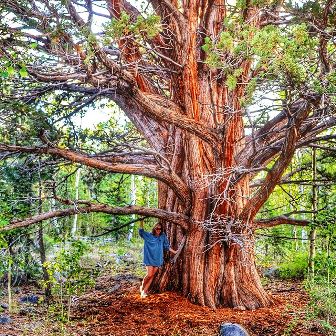
- Mention My Name Remembrance Service –This service will be hosted by Bishop Terry Brady at St Mary’s Cathedral, Sydney on Wednesday 2 September, commencing at 7.00pm. This service will honour and remember the names of those who have lost their lives through suicide or misadventure. A Juniper Tree of Hope will symbolically highlight and recognise those loved ones who have been lost. This service will be non-denominational and open to all in the community. Providing opportunity for consolation, reflection, solace, prayer and solidarity. It will be an opportunity to remember and not forget those who have gone. Acknowledging the impact and stigma for many who mourn after suicide. We would like to invite you to attend and also to please pass this information on to your own communities (work and personal) so that many are aware of this special evening.
A MANIFESTO FOR A NEW EARTH AND NEW HUMANITY

A manifesto for a new earth and new humanity
An article from the Centre's magazine Just Comment by Claude Mostowik MSC
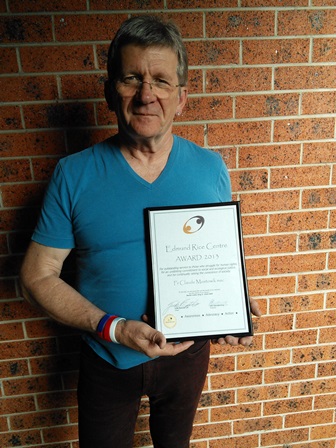
Laudato Si’ – On Care of Our Common Home
Pope Francis’s new encyclical, Laudato Si’, subtitled ‘On Care for Our Common Home’ underscores its main message: that we share a small interconnected planet which can only become a reality in ‘relationship’ with all creation, people and the Creator. This relationship calls all to a change or conversion of heart - both individual and communal. The Pope is making a challenging call to all people who seek justice and integrity of creation- not just people of faith. There is a call to make a space that allows dialogue and engagement to occur. There is a call to inclusion. An exclusion derived from a politics dictated more by special interests and powerful elites has resulted in our most vulnerable sisters and brothers being marginalised. Clearly here is a response to the cry of the earth and the cry of the poor.
We have here from Pope Francis a loving letter to all his sisters and brothers about our ‘sister’ Earth and how we need each other. Inspired by his namesake St Francis of Assisi who has modelled for 800 years a concern for the poor, the environment and for peace, the Pope use St Francis’ 13th century Canticle of the Creatures, a hymn to God's creation that refers to ‘brother sun’, ‘sister water’, ‘brother wind’, and ‘sister Mother Earth’. Our common home is like a sister with whom we share our life. It is a beautiful mother who opens her arms to embrace us. This mother now cries out to us because of the harm inflicted on her by our irresponsible use and abuse of the goods endowed to her.
The Encyclical begins with an invitation to enter into dialogue with all people about our common home. It is an appeal for a new dialogue about the future of our planet where everyone is included in the conversation because the environmental challenge we are undergoing, and its human roots, concern and affects us all. [LS 14] His concern is to encourage an honest and open debate so that particular interests or ideologies will not prejudice the common good. [LS 188]
Whilst drawing on the writings of his predecessors from John XXIII to Benedict XVI, Francis has been inspired by the Ecumenical Patriarch of Constantinople Bartholomew I, well-known as the ‘Green Patriarch’, and spiritual leader of many of the world’s 300 million Orthodox Christians. This encyclical is ecumenical in a more radical sense. It is not only addressed to Catholics or to Christians but an attempt by one of many leaders to address an issue that goes beyond the future of the church to the future of humanity. Laudato Si is at heart a call for a renewed and deepened humanity. It is not a mere policy document.
Prior to the release of Laudato Si’, the impression was that the encyclical would be more a policy statement to make the maximum impact on the negotiations at the upcoming UN Conference on Climate Change in Paris at the end of 2015 and would focus mostly on the issue of climate change. If it just spelled out policy goals for the Paris conference, Laudato Si’ would have a very short shelf life. It is nothing less than an assertive call for dialogue that will shape our lives for decades to come. Despite concerns by conservative politicians and church leaders about the church meddling in controversial politics and science, their reactions suggest that the Pope has hit a nerve by speaking a truth that many would like to hide and embarking on a revolution long needed.
It could be called a ‘spiritual’ document but it is a document of a faith that walks. It synthesises anthropology, spirituality, ethics, science, ecology and society. Above all, it addresses one of the most critical moments in human history. It has been called explosive, prophetic, bold and direct addressed to all people who will listen and want to be part of the solution to care for the earth, God’s creation.
As many people do, the Pope sees that something has happened and is happening to the earth and things need to change. We need to go beyond asking the crude question as to what will it cost to act or not act to asking about the value of respecting the earth with profound responsibility. Criticisms that have emerged seem to come from a desire to avoid responsibility for one another and for the whole of creation. Francis has said that we have clearly trashed the earth and our relationship with it is out of harmony - something that Indigenous people would appreciate more. As well as considering the destruction of the earth is his concern about poverty an issue that can drive many of the ‘haves’ crazy. He dares to speak while too many people live in silence.
The document highlights the interconnectedness and interdependence of all creation and how humanity has been damaging the earth by a technology and economics not based on moral values. This leads to increasing damage and wasteful consumption. It leads to a throwaway culture that negatively impacts on the poorest communities. Here is the link between the cry of the poor with the cry of the earth.
There is an intimate relationship between the poor and the fragility of the planet. It is not a simple call to action on climate change but an ‘integral ecology’ where dialogue and discussion leads to an expanded dialogue on the world's moral and political agenda. So far, the debate has been dominated by interests that were and are contrary to the common good. The Pope wants to open dialogue about the distorted values of consumer culture, the power of multinational corporations and abuse of power, the view that sees people and creatures as objects to be used, economic systems motivated by short term profit, a mentality that puts technology on a pedestal. ‘Today, in view of the common good, there is urgent need for politics and economics to enter into a frank dialogue in the service of life, especially human life.’ [LS 189] Interestingly, the word ‘dialogue’ is used at least 21 times, ‘debate’ 12 times, and ‘discuss’ 6 times.
The document mentions a number of symptoms such as climate change, resource depletion, water scarcity, loss of biodiversity, pollution and urban decay but we need to reflect on the causes. At heart, it comes back to a lack of moral foundations to guide us in our activity. Human technical progress and the domination that comes from that has outstripped humanity’s moral growth and respect for all living things, a fraternity where no one and nothing is excluded because the Earth as a ‘shared inheritance’, a ‘collective good’, the ‘patrimony of all humanity’, the ‘responsibility of everyone’. The conversion that we are called to must lead to a revolution in thinking and acting that leaves behind domination, control and abuse of power that results in more and more impoverished people and an impoverished Earth. It results from a new way of seeing where ‘right relationships’ or justice and the common good recognises that the forces of the market and corporateness cannot and will not respect the interconnectedness we need.
It is important for us in the Pacific region to remember also our relationship with the peoples of the Pacific who are inordinately affected by climate change with its effects on the people and their culture. Pope Francis states, ‘In recent decades this warming has been accompanied by a constant rise in the sea level and, it would appear, by an increase of extreme weather events...Humanity is called to recognize the need for changes of lifestyle, production and consumption, in order to combat this warming……..The warming caused by huge consumption on the part of some rich countries has repercussions on the poorest areas of the world, especially Africa, where a rise in temperature, together with drought, has proved devastating for farming.’ [LS 23] ‘Many of those who possess more resources and economic or political power seem mostly to be concerned with masking the problems or concealing their symptoms, simply making efforts to reduce some of the negative impacts of climate change.’ [LS 38]
Without being specific he rebukes some multinational corporations that operate in economically underdeveloped countries who ‘after ceasing their activity and withdrawing, they leave behind great human and environmental liabilities such as unemployment, abandoned towns, the depletion of natural reserves, deforestation, the impoverishment of agriculture and local stock breeding, open pits, riven hills, polluted rivers and a handful of social works which are no longer sustainable.’ [LS 51]
Francis tries to awaken the consciences of all, especially the economically and politically powerful, to the plight of the poor and the now impoverished earth. The environmental problem is part of a much larger problem - the failure to recognise the truth that we are all, everyone and everything, interconnected. We must read this Encyclical if we want to be part of the solution.
Sources:
‘Laudato Si’Read the Pope's environmental encyclical, Laudato Si'
Sarah Pulliam Bailey 10 key excerpts from Pope Francis' encyclical on the environment
Sydney Morning Herald June 19, 2015
Micah Bales Why Pope Francis’ Encyclical gives me hope
Sojourners June 18, 2015
http://sojo.net./blogs/2015/06/18/why-pope-francis-encyclical-gives-me-hope
SteffenBöhmPope’s climate letter is a radical attack on the logic of the market
The Conversation June 18, 2015
Leonardo Boff The Magna Carta of integral ecology: Cry of the Earth, Cry of the poor
Earth Charter in Action June 18, 2015
Joseph Camilleri Why Pope Francis is a prophet for our times
The Age June 20, 2015
http://m.theage.com.au/x/ghsk8w
Simone Campbell We need an integral ecology, not an economy of exclusion
Global Sister Report June 19, 2015 in
Benito CaoPope Francis wants us to be ‘ecological citizens’, but how?
The Conversation June 25, 2015
Ross Douthat Pope Francis’ Call to Action Goes Beyond the Environment
The New York Times June 20, 2015
Mark Dowd For every living creature on earth
The Tablet June 11, 2015
http://www.thetablet.co.uk/features/2/5789/for-every-living-creature-on-earth
Jim Ennis America To Till and Tend
Magazine June 19, 2015
http://www.americamagazine.org/issue/till-and-tend
Jacob J. Erickson Laudato Si’-Falling in Love With the Earth: Francis’ Faithful Ecology
Religion Despatches June 19, 2015
Graham GordonTowards a sustainable Creation
The Tablet June 18, 2015 by
Damien Howard Laudato Si’: a Seismic Event in Dialogue between the Catholic Church and Ecology
Thinking Faith June 18, 2015
James Martin Top Ten Takeaways from 'Laudato Si''
America Magazine June 18, 2015
http://americamagazine.org/issue/top-ten-takeaways-laudato-si
Bernadette Meaden Laudato Si - challenging the economic and political status quo
Ekklesia June, 2015
http://www.ekklesia.co.uk/node/21812
David Mills The Challenging Truth of Pope Francis' Encyclical on the Environment
Aleteia June 24, 2015
Geroge Monbiot Channelling the Joy
Guardian June 17, 2015
http://www.monbiot.com/2015/06/17/channelling-the-joy/
David NussbaumThe Pope is right: we must do more to protect our Common Home
The TabletJune 19, 2015
Bob PerciasepePope Francis highlights the moral imperative of climate action
Center for Climate and Energy Solutions June 18, 2015
http://www.c2es.org/blog/perciasepeb/pope-francis-highlights-moral-imperative-climate-action
Norman Pollack Moral Critique of Capitalist Profligacy CounterPunch June 22, 2015
http://www.counterpunch.org/2015/06/22/moral-critique-of-capitalist-profligacy/
Julie Power Pope Francis tweets: Our earth, our home, is becoming an immense pile of filth
Sydney Morning Herald June 24, 2015
Philip Pullella Pope calls for 'action now' to save planet, stem global warming, help poor
Sydney Morning Herald June 19, 2015
Carl Raschke A New Way of Being Green – Why Pope Francis’ Encyclical Is Not Ultimately About The Environment
Political Theology Today June 23, 2015
Daniel P. ScheidLaudato Si: Appealing to Our Better Natures
Political Theology Today June 19, 2015
http://www.politicaltheology.com/blog/laudato-si-appealing-to-our-better-natures-daniel-p-scheid/
Vandana Shiva“Laudato Si” – A 21st Century Manifesto For Earth Democracy
L’Huffington Post Italia June 21, 2015
http://www.countercurrents.org/shiva210615.htm
Nicholas Stern Protecting the environment: the Pope fills the leadership gap left by the world's politicians The Tablet June 18, 2015
FATHER TYSON DONELEY MSC, FUNERAL EULOGY, HIS LIFE
FATHER TYSON DONELEY MSC, FUNERAL EULOGY, HIS LIFE

My name is Tyson Doneley; I am my Uncle Tyson's eldest nephew. His father and grandfather were both known as Tyson, as is my son and his eldest son. The Tyson name has been associated with the Doneley family since 1827 when George Doneley married Isabella Tyson. The name lives on.
Ignatius Tyson Doneley was born on 5th Jan 1921, in Toowoomba, the second youngest of the children, of Aloysius Reginald Tyson
Doneley and his wife Minnie nee McGlynn. His 6 siblings were Bernie (my father) Frances Marchant, Marie, Joan Conrad, Camille Marchant, and Glynn.
His primary schooling was at the Marist Brothers College, Rosalie, in Brisbane, where he excelled at an early age in his studies and sports and from where he was awarded the St Joseph's Old Boys scholarship to complete his secondary studies at Hunters Hill. His father had been a student at St Josephs in the late 1890's. Cricket was his favourite sport. On his first day at Joeys he was told to report to the 1st XI practice nets. He had only just turned 15. He played a large part in the 1st Xi's 1937 premiership win heading both the batting and bowling averages, and played 5/8 in the premiership winning 1st XV in the same year
Tyson's first contact with the MSCs was when he saw a large church spire on a distant sand hill, while playing cricket in Centennial Park. The Sydney High keeper told him it was a Monastery and Uncle Tyse thought it might have been the Marists whom he had considered joining, and when he subsequently visited there he met 2 former Marist Old Boys, by now MSC priests, Fr Bill Graham and Fr John Tyler, who convinced him to join the MSC's. He recalled each time he drove by the park that on that day in April 1937 that he took 4 for 26 contributing to an innings win over High. Only last month on perhaps his last drive through the park he once again recounted those events of 78 years ago. Large trees now obscure the view of the monastery.
In his leaving certificate he secured three honours, five A's and one B. Foregoing a scholarship to Sydney University he entered the MSC Novitiate at St Mary's Towers, Douglas Park in 1938 completing his theological studies at the Sacred Heart College, Croydon;
He was one of 21 seminarians ordained by Archbishop Mannix in St Patrick's Cathedral Melbourne in July 1946 including 7 other MSCs from Croydon, Frs. G. P. Church, M.McPhillamy. W. J. Ryan. A. }.Sheridan, J. Savage, M. Atchison, B. J. Scrivener.
After his ordination he returned to Kensington to attend Sydney University gaining a BA majoring in Latin, in 1950. Subsequently while teaching at Downlands he secured a B Ed (UQ) 1957 and was awarded a MA (Sydney) in 1960, his thesis being "Two literary epics: a comparison of the Aeneid with Paradise Lost" He was appointed a Member of the Australian College of Education in 1966 and held a Diploma in Educational Administration (New England) 1970.
With these qualifications Uncle Tyse was destined to be a teacher, and coach, first at Downlands, then Chevalier, Princethorpe, Rugby, England, Monivae, and St Johns' Darwin where he was Principal at the time of cyclone Tracey.
In 1953 while sports master at Downlands he decided to take up club cricket, as he said, only because of all his cricket practice with the students. He became a regular player for Toowoomba, a sound all rounder, and was being considered in some circles a possible Sheffield Shield selection, perhaps even worthy of an Australian cap.
During school holidays he relieved as parish priest in many country towns and at Christmas he would often join his family for the holidays at Broadbeach where his parents had a holiday home.
In 1980 after 39 years a teacher, he retired and was then able to pursue his early ambition to be a missionary. Like the early apostles he travelled widely in his ministry. His first posting was to the Mission at Vunapope New Britain, then to Nagoya Japan.
After a spiritual renewal course in Chicago and the Holy Land in 1989 he spent the next 10 years at the new seminary in Kanjoor in Kerala and Bangalore in his beloved India, leaving every six months, in order to renew his visa, taking the opportunity to return home temporarily or to visit neighbouring countries. His last missionary assignments were to Indonesia and Fiji
Retiring again in 2003 after 23 years as a missionary he came back once more to Downlands. Health concerns resulting from an
oesophagectomy in 2003 and the onset of Parkinson's disease compelled him to relocate to the Monastery at Kensington and as his medical condition deteriorated he was admitted to St Joseph's Nursing home for Religious here at Kensington where he was lovingly cared for by the Sisters and nursing staff until his death.
We were very proud of Uncle Tyse being awarded the medal in the Order of Australia in 2013, for service through Catholic educational organisations.
For our family he was a very special person,
He was Uncle Tyse to all his 29 nieces and nephews and 55 grand nieces and nephews and numerous great grand nieces and nephews
He was always a welcome guest in our homes on birthdays and similar occasions. He was always good for a game of tennis, frequently defeating some of the younger generation
He was our family's own priest Celebrating Mass in our homes Conducting many Baptisms Officiating at numerous Marriages
Conducting funerals not only of his own parents but also his brothers and sisters and other family members.
He was a friend to all
Uncle Tyson was a sociable and affable person interested in every one he met and in their lives. He made each person feel they were special to him in some way.
He was a private, humble and modest man with no earthly possessions apart from the clothes he wore and an old putter and a few golf balls he kept in his room, but he had a wealth of memories from a life full of challenges and achievements.
He was a friendly companion to his brothers and sisters in religion.
Mentor to many Caring priest Gifted Teacher Sportsman Confidant,
In a word he was a wonderful PERSON
On the evening of Sunday 19th July as the light was fading his captain declared his innings over at 94, not bad for a leg spinner? From a life of teaching and preaching throughout Australia and a wide expanse of the world he always came back to his roots. His parents took him to Tyson Manor in Toowoomba as a newborn child, then his grandfather's home. He returned to the Manor again in 1950, which had by then become the priest's residence of Downlands and where it remains as such today.
He returned again to spend his last years in the Monastery at Kensington where he had first contacted the MSC's in 1937, and stayed in the same room he first occupied during his Sydney University days.
Today he is returning to St Mary's Towers, Douglas Park where he began his priestly studies 77 years ago, only a few kilometres from Appin where the first Doneleys settled in 1798. His final wish was to be with his Saviour in Heaven and be laid to rest in the grounds of the spiritual home of the MSC community, the last resting place for just over two hundred members of the province.
Farewell Uncle Tyse.
We all will indeed sorely miss you but will always lovingly remember you. FAREWELL
US GUN CULTURE - CONSEQUENCES
US GUN CULTURE - CONSEQUENCES
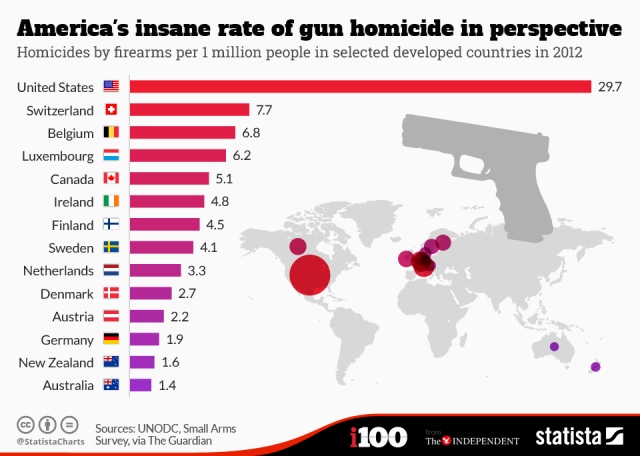
And Australia at the bottom of this graph.